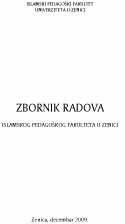ZASTUPLJENOST POEZIJE U HANDŽIĆEVOM KOMENTARISANJU KUR’ANA
POETRY IN HANDŽIĆ’S INTERPRETATION OF THE QUR’AN
Author(s): Halil MehtićSubject(s): Education
Published by: Islamski pedagoški fakultet Univerziteta u Zenici
Keywords: Handžić; Taffsir; interpretation; poetry; poets; Qur’an; Hadith; El-Bekare; En-Nisa’
Summary/Abstract: Mehmed ef. Handžić, (1906-1944) was a prominent Bosnian scholar with an imposing opus in different fields. The uniqueness of his works lies in the fact that he was the only one, in modern history of Bosnian Muslims, to interpret the Holy Qur’an in Arabic, and to treat the ayats with sharia background (ajatul-ahkam). His important interpretations are: the interpretation of the El-Bekare and En-Nisa' suras. Interpreting these suras he relied on some classic works of certain eminent mufessirs like: Taberij, Džessaa, Ibnul-'Areby, Kurtuby, Alusy, Zamahshery, Razy, Bejdavy, Ibn Kesir, Dželalejn, Nesefy, etc. among the mentioned mufessirs there are representatives of traditional, rational and linguistic method of interpreting the Qur’an and that shows that Handžić ingeniously managed to make a synthesis of the three Taffsir methods. He also often relied on other sources such as Hadith, Fikh, and some linguistic works. Analyzing Handžić’s interpretation of the Qur’an, it is obvious that he, like other representatives of traditionally-rational method of interpreting the Qur’an, also used poetry as additional arguments in finding a proper solution to some sharia-legal issues. He only twice names the two poets: El-E'aša and El-Kusejjir. Researching his use of poetry, we found out that he borrowed some stanzas from Ebu Temam bin Evs Et-Tai-y and Hassan bin Sabit. For some of the borrowed lines sources are unknown. This paper presents some of the examples that back up our statements.
Journal: Zbornik radova Islamskog pedagoškog fakulteta u Zenici
- Issue Year: 2009
- Issue No: 07
- Page Range: 225-235
- Page Count: 11
- Language: Bosnian

